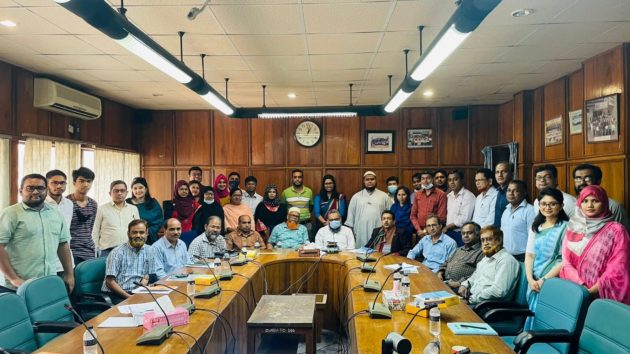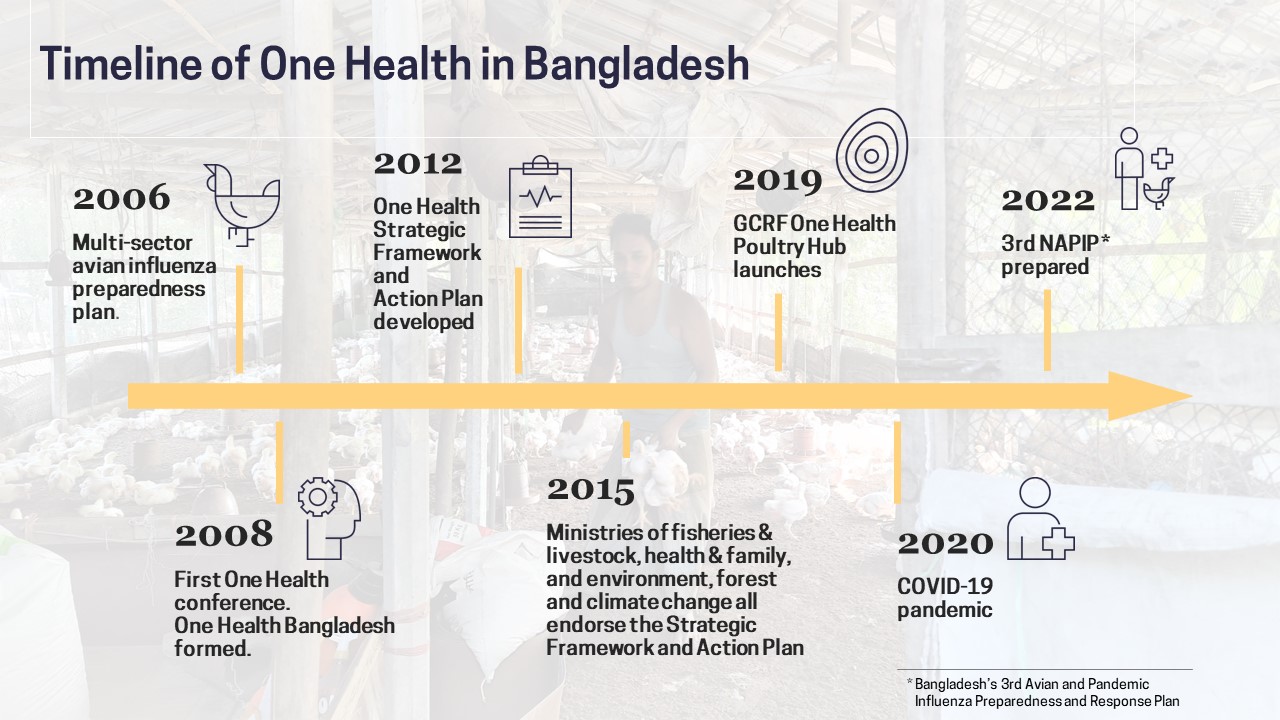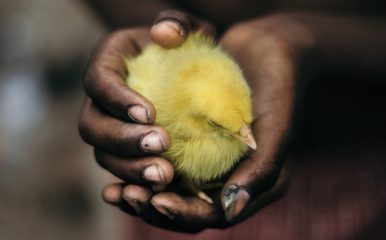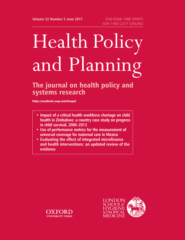
Making Impact
ONE HEALTH IN BANGLADESH AND BEYOND

Practical and positive cross-sector change, from policymaking to community action, is being felt across Bangladesh. Hub investigators are working across many levels with many people to ensure better health becomes a reality for people, animals and the environment.
The health of people, animals and the environment are intrinsically linked. This is the basis of the One Health approach, and it follows that working across human, animal and environmental health disciplines and sectors is not only beneficial but necessary for optimal health for all.
In the first years of this century, the One Health approach received a boost following a spate of ‘spillovers’ of disease from animals to humans. In particular, the emergence and spread of SARS, which killed more than 700 people, spurred disease experts and decision makers into a global flurry of activity in pandemic preparedness.
With the publication of research showing that some 60% of known infectious diseases and up to 75% of new or emerging infectious diseases are of animal origin, interest grew further in the threat from these diseases, which are known as ‘zoonoses’ – and multisector, collaborative One Health ways to respond to them.
The One Health Poultry Hub has supported, strengthened and extended One Health in Bangladesh. It has ensured a strong, adaptive platform is now facilitating positive health change in the country and its lessons have strong relevance for similar initiatives regionally.
Community of practice
Bangladesh was an active and visible member of the international One Health community from the start. In 2007, prompted by an avian influenza outbreak, senior researchers at Chittagong (now Chattogram) Veterinary and Animal Sciences University in Bangladesh, initiated a civil society network of researchers and technical experts in animal and human health.
That network led directly to the launch a year later of One Health Bangladesh, a professional body with membership open to doctors, vets, agriculturalists, environmentalists, wildlife experts, ecologists, anthropologists, economists, allied scientists, practitioners and activists.
One Health Bangladesh is now an active community of practice, part civil society organisation and part think tank. It mobilises professional networks spread across many institutions to advance the One Health agenda, convenes collaborations at national, regional and international levels, and secures endorsements from previously disparate experts. There is regular engagement with government agencies. Its activities focus on strengthening surveillance capacities, promoting and sharing research findings, facilitating evidence-based decision making and supporting capacity-building initiatives.
International development research projects
The involvement of One Health Bangladesh leaders in international development research projects, including the Zoonoses and Emerging Livestock Systems-funded BALZAC project and a Bill & Melinda Gates Foundation supported Chatham House project on livestock strategy, helped lay the foundations of the intellectual questions behind the One Health Poultry Hub in Bangladesh.
The launch of the Hub in 2019, further mobilised international and regional research expertise around One Health in Bangladesh. It enabled Bangladesh investigators to make a strong case for a national-level forum where policymakers and other key stakeholders such as livestock industry partners could consider credible, objective evidence related to zoonotic diseases and beyond, including antimicrobial resistance.
Policy influencing links, research skills, capacity building and practical action intersect and reinforce each other.
In this way, the Hub helped to lay the foundations for the One Health Steering Committee, a forum for high-level policy leadership across government ministries which institutionalises evidence-based policymaking related to infectious diseases in Bangladesh. The Hub thus also ensured a path via which its own important findings related to avian influenza could find their way to decision makers.
Both led directly to the development of Bangladesh’s 3rd Avian and Pandemic Influenza Preparedness and Response Plan (NAPIP), which will guide policy and practice for the control of avian influenza in Bangladesh for the five-year period to 2026.
Many of the investigators and institutions represented in the One Health Poultry Hub in Bangladesh and the broader One Health movement in Bangladesh are one and the same. The work of both have become in good part entwined.
The relationship has created a virtuous circle through the Hub in Bangladesh as policy influencing links, research skills, capacity building and practical action intersect and reinforce each other. This is particularly so at ground level with training initiatives and community engagement activities.

Timeline of One Health in Bangladesh
In addition to helping support the work of the One Health Steering Committee and drafting of the NAPIP, tangible achievements directly attributable to this relationship include:
- The establishment of One Health fellowships and field epidemiology training programmes for human health experts and veterinarians.
- Involvement in international One Health initiatives, including with the Food and Agriculture Organization of the UN (FAO), the US Centers for Disease Control and Prevention (CDC), Rockefeller and Ecohealth Alliance.
- Providing an inspirational example of One Health in action and practical strategy template to follow for other countries in the region.
Hub partner the Institute of Epidemiology, Disease Control and Research now hosts the One Health Secretariat as a part of Government. Hub co-investigator in Bangladesh Professor Nitish Debnath is a founding member of the One Health High-Level Expert Panel convened by the World Health Organization.
- Top image: One Health delegates at a stakeholders meeting in Bangladesh.


